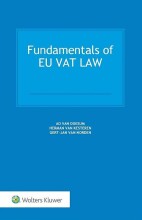Summary: Fundamentals Of Eu Vat Law | 9789041170170 | Ad van Doesum, et al
- This + 400k other summaries
- A unique study and practice tool
- Never study anything twice again
- Get the grades you hope for
- 100% sure, 100% understanding
Read the summary and the most important questions on Fundamentals of EU VAT Law | 9789041170170 | Ad van Doesum; Herman van Kesteren
-
1 Introduction
-
1.1 Introduction
-
What were the reasons behind the implementation of turnover taxes in various European countries during different historical periods?
- To cover the costs of crisis or war, such as the expenses of the First World War
- France (1920) and Belgium (1921) introduced general turnover taxes for this purpose
- UK introduced excise duties in 1940, and the Netherlands in 1934, as responses to crisis
- Turnover taxes, often introduced as 'temporary' measures, became permanent in most European countries
-
How did the concept of VAT evolve within the European Economic Community (EEC) which later became the European Union (EU)?
- In 1967, EEC Member States including Belgium, France, West Germany, the Netherlands, Italy, and Luxembourg agreed to harmonize their turnover taxes
- They opted for a common system of turnover tax in the form of Value Added Tax (VAT)
- VAT has become a significant source of tax revenue in all EU Member States, generating approximately EUR 1,047 billion per year
-
1.2 Terminology: 'Consumption Tax', 'Indirect Tax', 'Turnover Tax' and 'VAT'
This is a preview. There are 4 more flashcards available for chapter 1.2
Show more cards here -
How can consumption taxes be defined and what do they aim to tax?
- Defined as taxes targeting the private consumption of goods/services
- May be interpreted as a tax on everything a private consumer consumes
- Also viewed as a tax that effectively taxes income (at the time it is consumed)
- Or considered a tax on the expenditure of private consumers
-
What is a consumption tax like, specifically the European VAT?
- Considered a tax on everything a private consumer consumes
- Uses the expenditure of private individuals to establish the monetary value of consumption
- Factors affecting this interpretation include challenges in defining consumption and intervals between purchase and actual consumption
- Monetary value of a good must be determined to levy the tax
-
What challenges arise in defining 'consumption' in the context of consumption taxes?
Difficulties in defining whether a good is actuallyconsumed - Potential
interval betweenpurchase expenditure and actualconsumption - Some
goods may be 'consumed ' over an extended period oftime
-
Why are consumption taxes typically levied indirectly instead of directly on private individuals?
- Tax system difficult for authorities to control
- Supply of goods and services by suppliers taxed instead
- Idea that taxing supply eventually taxes private consumption
- Taxing consumption indirectly implies further abstraction
-
What are the two classes of consumption tax and how do they differ?
- Specific consumption tax: taxes certain goods/services (e.g., excise duties)
- General consumption tax: taxes all goods/services consumed
- EU VAT is a general tax on consumption
-
How do general taxes on consumption differ in terms of their form?
- Single-stage taxes: imposed on one leg of production/distribution chain
- Multiple-stage taxes: imposed on supplies in more than one chain leg
- EU VAT is an all-stages tax, levied on all supplies made until retail trade stage
-
What is the implicit assumption behind taxing the supply of goods and services instead of private consumption directly?
- Entrepreneur includes consumption tax in prices
- Tax on supply eventually taxes private consumption
- Further abstraction from taxing private consumption accepted
-
What does the term 'EU VAT' refer to, in relation to consumption taxes?
- General tax on consumption
- All-stages tax imposed on all supplies of goods/services up to retail trade stage
- EU VAT is one manifestation of a turnover tax and a form of consumption tax
- Higher grades + faster learning
- Never study anything twice
- 100% sure, 100% understanding
































